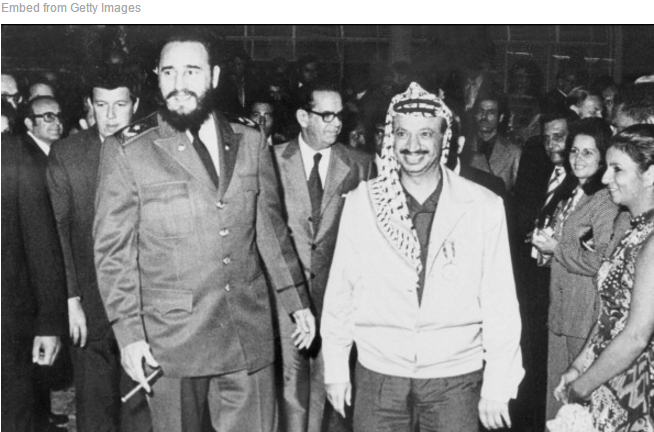Fidel Castro, the revolutionary leader who ruled Cuba for nearly half a century, died on November 25 at the age of 90.
Despite Cuba’s small size and the long distance separating it from the Middle East, Castro’s Cuba played an active role in the region in the 1960s and 70s. Claiming to act in promotion of anti-imperialist causes, the Cuban government trained Palestinian Liberation Organization (PLO) guerrillas, sent soldiers to Algeria to fight against French colonialism, and even deployed a tank brigade to Syria to take part in the 1973 Arab-Israeli war. It also backed the Marxist-Leninist government of South Yemen, and supported the Polisario Front in Western Sahara in its struggle against Morocco.
Aside from its many military expeditions in the region, Castro’s Cuba also sent medical missions to several countries in the Middle East.
Although many in the Middle East and North Africa eulogized the Cuban leader, heads of the Arab Gulf states were less effusive, while Israeli leaders have remained silent.
Here’s what leaders from Western Sahara to Iran had to say about the legacy of “El Comandante”:
Algeria
“With his passing, I lose, personally, a friend and companion of more than half a century. This is also a great loss for the people of Algeria who have a special relationship with El Comandante, made of respect, admiration and mutual affection.”
– President Abdelaziz Bouteflika
Hezbollah
“[Castro was] a historic symbol whose life was a lighthouse to all revolutionaries around the world.”
– Ammar al-Mousawi, Hezbollah’s head of international relations
Iran
“In this age – when oppressed nations around the world suffer from violations of the most obvious and fundamental human principles such as peace, justice and freedom – it is fortunate there are free men and warriors who do not give up fighting until the last days of their lives to keep the flag of justice high.”
“Castro was a prominent figure in fighting against colonialism and exploitation [of oppressed people]; he was a symbol of independence seeking struggles of the oppressed.”
– Foreign Minister Mohammad Javad Zarif
Lebanon
“The commander of the Cuban revolution left for almost a century a mark on the world’s conscience thanks to his long experience, his power to persuade and the esteem with which he was beheld, so that his political attitudes and national debates became a unique approach of its own.”
Palestinian Authority
“[Castro] spent his life fighting for the causes of his country and people, and the causes of right and justice in the world.”
Popular Front for the Liberation of Palestine (PFLP)
“PFLP is mourning the death of the great revolutionary leader and former president of the democratic republic of Cuba … Fidel Castro, who died on Friday evening after spending his life serving the principles and goals of the socialist revolution. He struggled against worldwide imperialism and the powers of despotism and colonialism, at the forefront of which was Zionism.
“Fidel Castro took a progressive position on the Palestinian issue, always helping the Palestinian revolution in speech and in deed. He always took a position against Zionism, describing the Zionist entity as a creation of worldwide imperialism, constantly criticizing its crimes against our Arab and Palestinian peoples.”
Polisario Front (Western Sahara)
“[Castro was a] giant among giants who, with courage and conviction, determined the course of humanity towards the liberation of peoples. He lived to see the realization of an essential part of their dreams from that revolutionary conviction, generosity, and solidarity in Latin America, Africa, and Asia.”
– Secretary-General Brahim Ghali
Syria
“The great leader Fidel Castro led his people’s and his country’s struggle against imperialism and hegemony for decades.
“His resistance became legendary and inspired leaders and people all over the world … Cuba, a friendly country, was able thanks to its leaders to resist against the toughest sanctions and most unjust campaigns in our modern history.”
The Arab Gulf states
Qatar, Bahrain, and Kuwait all expressed condolences over Castro’s death, but were not nearly as effusive in their praise as other countries in the Middle East. Kuwaiti emir Sheikh Sabah al-Ahmad al-Jaber al-Sabah described Castro as “one of the world’s most iconic leaders,” while Bahraini Prime Minister Prince Khalifa bin Salman Al Khalifa “recall[ed] with respect his role in the development of Cuba, as well as his historic stances supporting Arab issues.”
